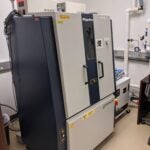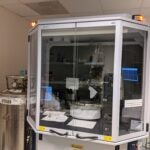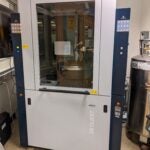Instrument Training & Instruction

Course Information
The Department of Chemistry offers a graduate level X-ray diffraction course (CHEM 5115: X-ray
Crystallography Methods) each Spring semester. Lectures cover point and space group symmetry, X-ray generation and diffraction physics, and the underlying theory of crystallography. Students also gain hands-on, practical experience with the instrumentation and software. CHEM 5115 is open to all
Georgetown graduate students, upper year undergraduate Chemistry majors, and students eligible
through the Consortium of Universities of the Washington Metropolitan Area. It is highly recommended that all new graduate students who will be using the X-ray diffraction facilities take CHEM 5115 in their first year as it provides the foundation for individual instrument training. If you are interested in sitting in on the class without formal registration, please contact the course instructor directly.
Instrument Training
To schedule instrument training or discuss experiment details, please contact Dr. Jeff Bertke. The instrument training descriptions below are an overview and details specific to your needs will be provided when you meet with Dr. Bertke.
Powder Diffraction Training:

Rigaku UltimaIV, Regents Hall 240
This is the quickest and easiest training to complete. It generally requires two sessions that last 1-2 hours each.

Bruker APEX DUO, Basic Science Building 127
Powder diffraction data can be collected on this single crystal instrument using the Cu source. The training covers reconfiguring the instrument, data collection, and integration of the 2-D diffraction images into a powder pattern. It generally requires four to five sessions that vary in length of time.
Single Crystal Training:

Bruker D8 Quest, Regents Hall 234A
Single crystal training is quite intensive and takes many sessions that are often > 2 hours in length. The training covers crystal selection and mounting, unit cell determination, experiment set-up, the importance of a ‘fast scan’, data collection, and data processing. It is highly recommended that users enroll in CHEM 517.

Bruker APEX DUO, Basic Science Building 127
Single crystal training is quite intensive and takes many sessions that are often > 2 hours in length. The training covers crystal selection and mounting, choice of wavelength, unit cell determination, experiment set-up, data collection, and data processing. It is highly recommended that users enroll in CHEM 517.
Instructional Videos
Video link: https://youtu.be/rIuLtKrtsuk
Video link: https://youtu.be/ynvZIX6Uc8U
Video link: https://youtu.be/U3U87RXOMQ8
Video link: https://youtu.be/dLz-adPrm7M
